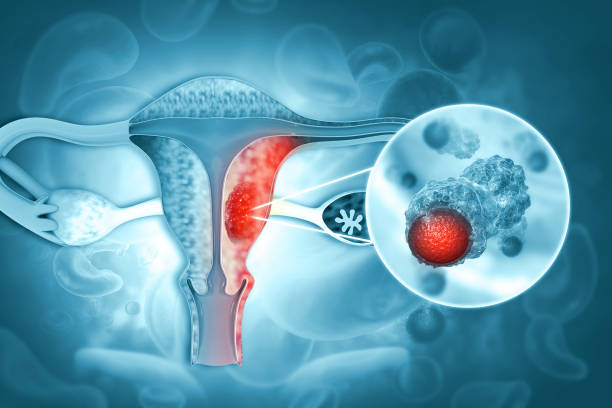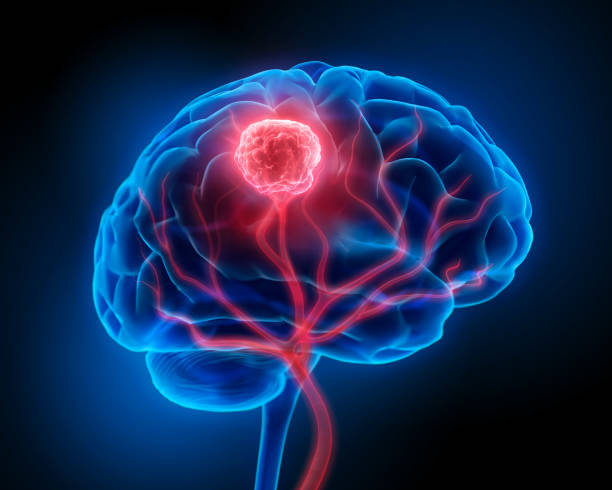
Endometrial cancer is cancer of the endometrium, the lining of the uterus. It is the most common type of cancer that affects the female reproductive organs. It develops when the cells of the endometrium start to grow too rapidly. The lining of the uterus may get thicker in places and form a mass of tissue called a tumor and ca spread to nearby structure and to other areas of the body.
They are classified into two types:
- Type 1 cancers are usually not very aggressive and they don’t spread to other tissues quickly. Type 1 endometrial cancers are thought to be caused by too much estrogen harmone.
- Type 2 cancers are more aggressive types and likely to grow and spread outside the uterus, they have a poorer outlook and not realted to estrogen excess.
Endometrial carcinomas can be further divided into different types based on how the cells look under the microscope, known as histological subtypes example Adenocarcinoma (most commmon), Adenosquamous (or mixed cell), Uterine carcinosarcoma, Clear-cell carcinoma, Mucinous adenocarcinoma, Undifferentiated carcinoma etc. They are also divided into molecular subtypes like POLE ultramutated, Microsatellite instability, Hypermutated, Copy number low, and Copy number high.
Some of the risk factors associated with occurrence of endometrial cancers are :
- Age: Endometrial cancers are common in post menopausal age group.
- Levels of hormones: These tumors are hormone dependant. When estrogen is present without enough progesterone, it can cause the endometrium to become too thick. This condition can develop if you have irregular menstrual periods, are in peri menopause or menopause, or have certain medical disorders, such as polycystic ovary syndrome (PCOS).
- Being overweight: Body mass index (BMI) of 25 or greater is a major risk factor for endometrial cancer. As BMI increases, so does the risk of cancer
- Genetics: Lynch syndrome is an inherited condition that increases the risk of colon cancer, ovarian cancer, endometrial cancer, and other types of cancer. It is caused by a change or mutation in a gene that is passed down in families.
- Hormone replacement therapy: Use of some form of hormone replacement therapy (estrogen only) for treatment of post menopausal symptoms increases your risk of endometrial cancers.
The most common symptom of endometrial cancer is abnormal uterine bleeding. This may include irregular menstrual bleeding, spotting, and bleeding between menstrual periods in ladies before menopause. After menopause, any bleeding or spotting is abnormal.
Symptoms of advanced endometrial cancer may include abdominal or pelvic pain, bloating, feeling full quickly when eating and changes in bowel or bladder habits.
There are no screening tests to detect endometrial cancer if you have no symptoms. After menopause, any abnormal bleeding needs to be checked.
The test uses for diagnosis include:
- Transvaginal ultrasound: It measures the thickness of the endometrium and the size of the uterus. A thicker endometrium means that you need more testing.
- Endometrial biopsy: Here, a sample of the endometrium is removed and looked at under a microscope. It can be done with dilation and curettage (D&C) or hysteroscopy where a lighted instrument with a camera called a hysteroscope to help guide identify the area of disease in the endometrium.
Endometrial cancer is usually treated with surgery. It included removing the cervix and uterus (total hysterectomy) and removing both ovaries and fallopian tubes (salpingo-oophorectomy). Lymph nodes and other tissue may be removed and tested to find out if they contain cancer.
After surgery, the stage of disease is determined. The stage of cancer affects the treatment and outcome and helps to decide if more treatment, such as chemotherapy or radiation therapy, is needed. Stages of cancer range from I to IV. Stage IV is the most advanced.
Radiation stops cancer cells from growing by exposing them to high-energy X-rays. It is recommended in higher stages who have a higher risk of the cancer coming back (recurrence).
Chemotherapy is recommended for advanced-stage and recurrent endometrial cancer. Chemotherapy is the use of cancer-fighting medications. It is often combined with radiation therapy.






